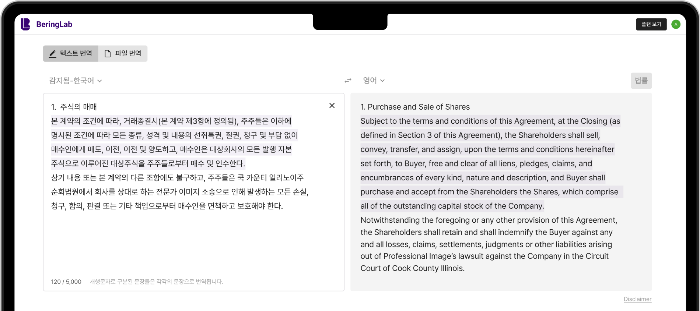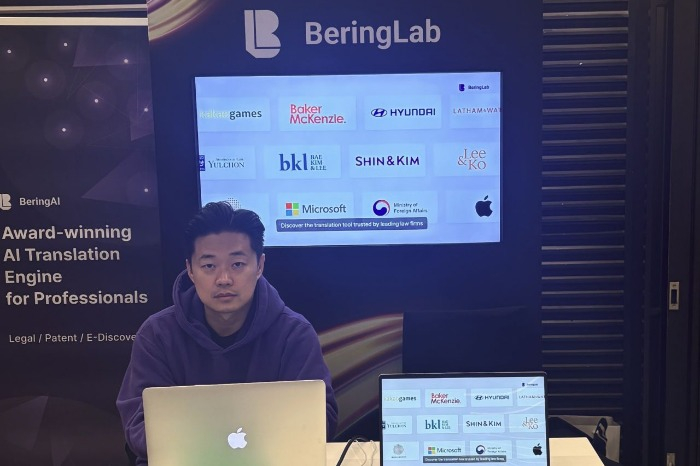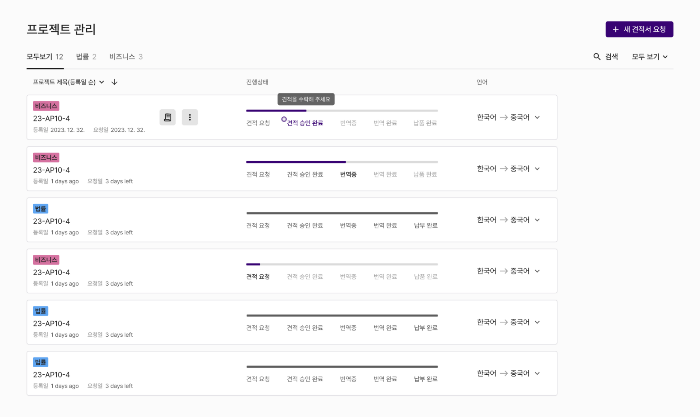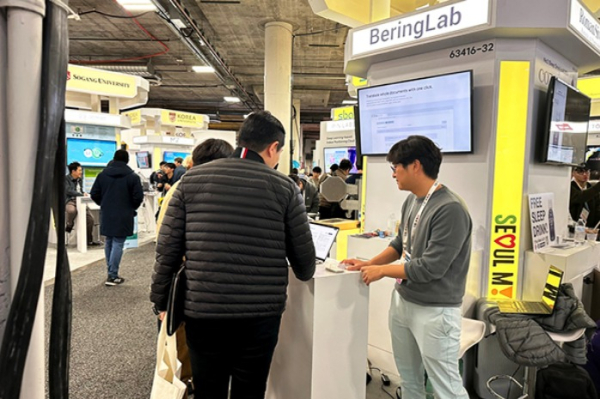Bering Lab eyes 7-fold jump in revenue in 5 years
South Korea’s sole legal AI translation startup is seeking to go global, starting with Asia and then to Europe and the US
By Nov 21, 2024 (Gmt+09:00)
LG Chem to sell water filter business to Glenwood PE for $692 million


KT&G eyes overseas M&A after rejecting activist fund's offer


Kyobo Life poised to buy Japan’s SBI Group-owned savings bank


StockX in merger talks with Naver’s online reseller Kream


Meritz backs half of ex-manager’s $210 mn hedge fund



Bering Lab Inc., a South Korea-based artificial intelligence technology-powered translation startup with specialties in legal, financial and intellectual property content, is looking beyond its home turf to achieve about 20 billion won ($14.4 million) in revenue in the next five years, said its chief.
“Our priority is to become Korea’s dominant player by volume in the Korean (translation) market with strength in special domains, like legal space, and we hope to achieve that goal in three years,” Kim Jae-yoon, co-chief executive officer of Bering Lab, said in a recent interview with The Korea Economic Daily.
“And then, we aim to join the global top 100 translation company club, which is open to a (translation) company with an annual revenue of 20 billion to 25 billion won in five years,” added Kim. “We are eyeing global revenue of about 20 billion won.”
Global language services and localization industry intelligence firm Nimdzi Insights releases the Nimdzi 100, its global top 100 language service company list, ranking translation, localization, interpreting and language technology providers, every year.
Bering Lab is Korea’s sole translation company with a particular focus on legal, financial and IP content, according to Kim, who co-founded the startup in 2020 with co-CEO Moon Seong-hyun, who once worked as an attorney at the prominent law firm Yulchon in Korea.
The Seoul-based language service provider reported $2.1 million in revenue in 2023, according to Bering Lab.
Overseas projects account for about 20% of Bering Lab’s total revenue, Kim said, adding that the company aims to raise the proportion to 50% within the next three years.

Serving more than 300 clients, mainly law firms, patent firms, corporate legal departments and government agencies from 15 countries, Bering Lab is seeking to expand its presence globally.
BERING AI AND BERING AI PLUS
There are countless translation companies of all sizes across the world.
Bering Lab, however, stands out among its general translation service peers thanks to its focus on specific sectors and a pool of 500 translators who are former lawyers or have professional legal, financial or IP industry backgrounds.
They mainly post-edit documents translated by AI.
Bering Lab offers Bering AI, a subscription-based AI-powered translation service for individual or enterprise use, and Bering AI Plus, an annual contract-based AI translation service backed by human lawyers’ post-editing services.
Its translation engine is built on neural network machine learning, as well as big data and natural language processing.
Thanks to its neural network-based AI model, trained with translation datasets amassed over more than a decade by Bering Lab’s predecessor, Bering Legal, Bering Lab’s translation services ensure higher levels of accuracy in translation than large language model (LLM)-based AI translation, Kim said.
Bering AI’s legal BLEU score is 1.7 times higher than OpenAI’s Chat GPT score, according to Bering AI.
The company also boasts strict and high data security protection that can prevent the leakage of confidential information during translation.
Every piece of translation data is coded, and both original and translated content are immediately removed from the company’s server once a client downloads it.

Bering Lab’s services also help lower their clients’ translation costs by about 40% while completing translation projects three times faster than conventional labor-intensive human translation, according to the startup’s co-CEO.
The company plans to develop new tools and features to speed up Bering Lab’s AI translation ten-fold, Kim said.
LLM ADD-ON
In particular, Bering Lab is mulling utilizing LLM models to improve fluency and consistency in its translation.
“Generative (AI) engines are very good at maintaining fluency, context and consistency in translation … We are also exploring ways to incorporate LLMs to make our translation more fluent and consistent,” said Kim.
Bering Lab’s post-editing by human translators can also be used as a dataset to train AI for editing once enough data are accumulated, according to Kim.
“If AI edits translation before post-editing by human translators, we could speed up the translation time and improve accuracy further,” said the CEO.
But the most pressing matter now is the full automation of the labor-intensive and inefficient translation workflows, said Kim, adding that Bering Lab is seeking to automate the overall content translation process from beginning to end.
Translation automation is not only about machine translation but the whole translation process, including translation management.
Bering Lab is not competing with generative AI-driven translation tools that are good enough to translate unspecific or general translation.
It targets more complicated and complex translation markets where specific translation needs remain unmet, said Kim.
ADDING MORE LANGUAGES AND SECTORS
To achieve its goal, it will add more languages and venture into other domains, such as clinical trials and information technology content translation.
Bering Lab translation covers nine languages: Korean, Japanese, Chinese (traditional and simplified), Indonesian, French, German, Spanish, Greek, and Arabic. It has completed the development of a Vietnamese translation model while developing translation models for Thai, Portuguese, Russian and Italian, Kim said.
Every language can be translated by Bering AI into English or vice versa.

With the extensive language coverage and domain addition, Bering Lab actively seeks to go global.
“A multinational company in the US, for example, needs to translate an original English document into 30 to 40 different languages. Demand for such large-scale translation projects is high,” said Kim.
“Our goal is to provide the right solution for such complex (translation) projects.”
The company recently set up an entity in Singapore and is considering opening a US entity.
MORE BUSINESS OPPORTUNITIES AHEAD
In August, Bering Lab completed a 3 billion won pre-A Series funding round, which SBVA, former SoftBank Ventures Asia, led. The US venture capital MBA Fund also joined the round.
Combined with previous funding, including Naver Corp.'s seed funding in 2020, the company has garnered a total of 3.8 billion won since its foundation.
It will use the latest funds to upgrade Bering AI and Bering AI Plus, add more diverse language translation services and expand translation services into other sectors.

The global translation market is estimated at about 80 to 90 trillion won, of which at least 16 trillion won is the professional translation market for specific domains such as legal, patent and clinical trials content, according to Bering Lab.
“The market is vast, and more business opportunities are ahead,” said Kim.
“General machine translation engines cannot cover everything for various reasons such as data security and quality issues. The specific sector-focused translation market is expected to grow further.”
Earlier this year, Bering Lab was invited to Asan Voyager, a program The Asan Nanum Foundation launched to assist Korean startups entering the US by providing acceleration, coaching, community learning and long-term residency support.
Write to Sookyung Seo at skseo@hankyung.com
Jennifer Nicholson-Breen edited this article.
-
 Korean startupsMediaiplus aims to be the Amazon of clinical trials
Korean startupsMediaiplus aims to be the Amazon of clinical trialsNov 01, 2024 (Gmt+09:00)
6 Min read -
 Korean startupsNear Brain gives hope to millions of stroke patients worldwide
Korean startupsNear Brain gives hope to millions of stroke patients worldwideSep 26, 2024 (Gmt+09:00)
6 Min read -
 Korean startupsHudson AI dreams of a world without language barriers
Korean startupsHudson AI dreams of a world without language barriersSep 04, 2024 (Gmt+09:00)
6 Min read -
 Korean startupsYC-backed Relate defies conventional wisdom for deeper integration
Korean startupsYC-backed Relate defies conventional wisdom for deeper integrationAug 27, 2024 (Gmt+09:00)
6 Min read -
 Korean startupsEnormous market ahead for Hopae, S.Korean DID pioneer
Korean startupsEnormous market ahead for Hopae, S.Korean DID pioneerAug 22, 2024 (Gmt+09:00)
5 Min read -
 Korean startupsMLOps startup Vessl AI eyes 50% sales from US in 2025
Korean startupsMLOps startup Vessl AI eyes 50% sales from US in 2025Aug 05, 2024 (Gmt+09:00)
5 Min read -
 Korean startupsColosseum poised for next leap with global expansion drive
Korean startupsColosseum poised for next leap with global expansion driveJul 29, 2024 (Gmt+09:00)
6 Min read -

-
 Korean startupsPhyxUp closes in on pre-seed round with US advance
Korean startupsPhyxUp closes in on pre-seed round with US advanceJul 03, 2024 (Gmt+09:00)
4 Min read -
 Korean startupsDentlink, virtual lab for dentists around the world
Korean startupsDentlink, virtual lab for dentists around the worldJun 20, 2024 (Gmt+09:00)
5 Min read -



